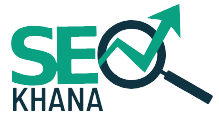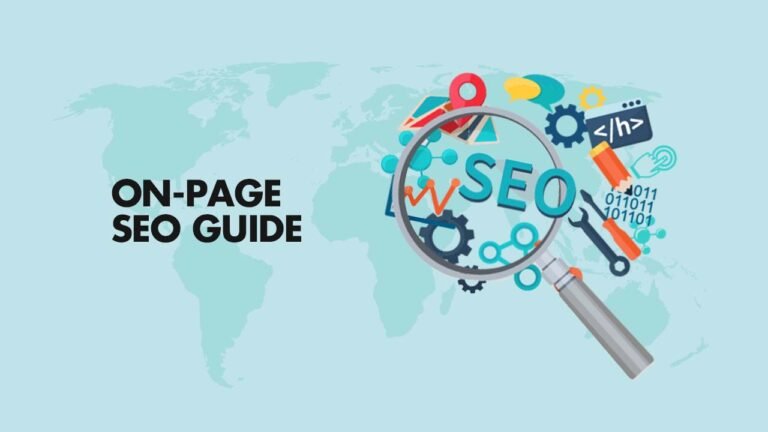In today’s competitive digital landscape, having a visually appealing website is not enough. To stand out in search engine results and attract the right audience, businesses must focus on On-Page SEO Services the practice of optimizing individual web pages to improve visibility, usability, and relevance. On-page SEO encompasses elements such as keyword optimization, meta tags, content structure, URL organization, internal linking, and user experience, all of which work together to enhance your website’s performance in search results.
Whether you run a corporate site, a blog, or an e-commerce platform, implementing effective on-page SEO strategies is crucial for driving organic traffic, increasing conversions, and building a strong online presence. By partnering with an experienced on-page SEO agency or on-page SEO specialist, businesses can ensure that every page is optimized to meet both search engine algorithms and user expectations.
This comprehensive guide explores the key components of on-page SEO, how to perform audits, the role of specialists, and the benefits of professional services, helping you make informed decisions to boost your website’s search performance.
What is On-Page SEO?
On-page SEO refers to the practice of optimizing individual web pages to rank higher in search engine results and attract more relevant traffic. Unlike off-page SEO, which involves external factors like backlinks, on-page SEO focuses on elements within your website that you can control.
Key components include:
- Content Quality: Crafting informative, engaging, and keyword-rich content.
- HTML Tags: Optimizing title tags, meta descriptions, and header tags.
- URL Structure: Creating SEO-friendly URLs that are concise and descriptive.
- Internal Linking: Establishing a logical link structure to enhance navigation.
- Image Optimization: Using descriptive file names and alt attributes for images.
Key Elements of On-Page SEO
On-page SEO focuses on optimizing the components of your website that are directly under your control. Understanding and implementing these elements correctly ensures your website ranks higher in search engines and provides a better user experience. Here are the core elements:
1. Keyword Optimization
This is the process of researching and using the right keywords that your audience is searching for. It ensures your content matches search intent and appears in relevant searches.
2. High-Quality Content
Content is king. This means creating informative, original, and engaging content that solves problems for users. Proper headings (H1, H2, H3) make it easier to read and for search engines to understand.
3. Meta Tags Optimization
Meta tags include the title tag (shown in search results) and meta description (a brief summary). Optimizing these helps search engines understand your page and can increase click-through rates.
4. URL Structure
A clear and descriptive URL helps both users and search engines know what the page is about. Example: www.example.com/on-page-seo-tips is better than www.example.com/page?id=123.
5. Internal Linking
This is linking one page on your website to another. It helps search engines discover new pages and distributes authority across your site.
6. Image Optimization
Using images correctly improves SEO and user experience. This includes using alt text (descriptions for accessibility and SEO), proper file names, and compression to speed up page loading.
7. Technical On-Page SEO
These are behind-the-scenes elements like page speed, mobile-friendliness, structured data (schema), canonical tags, and fixing crawl errors. They ensure search engines can access, understand, and rank your pages efficiently.
8. User Experience (UX)
This includes the layout, navigation, readability, and overall usability of the website. Good UX reduces bounce rate and increases time spent on the site, which positively affects rankings.
The Role of an On-Page SEO Specialist
An on-page SEO specialist is a professional dedicated to optimizing the individual pages of a website to improve its search engine rankings and user experience. Their work is crucial because even a beautifully designed website may fail to attract traffic without proper on-page SEO.
Key Responsibilities
- Keyword Research and Implementation
- Identify high-value keywords relevant to the business and target audience.
- Strategically incorporate these keywords into titles, headings, meta descriptions, content, and URLs.
- Content Optimization
- Ensure all content is original, high-quality, and aligns with user intent.
- Structure content with proper headings (H1, H2, H3) and include multimedia elements for engagement.
- Meta Tags and HTML Optimization
- Write compelling title tags and meta descriptions that improve click-through rates (CTR).
- Optimize HTML tags like header tags, alt text for images, and schema markup for rich results.
- Internal Linking and Site Structure
- Develop a logical internal linking strategy to distribute page authority.
- Ensure a clear website hierarchy so users and search engines can navigate easily.
- Technical On-Page SEO
- Improve page speed, mobile responsiveness, and Core Web Vitals.
- Fix crawl errors, manage canonical tags, and implement structured data.
- Monitoring and Reporting
- Track key metrics like organic traffic, bounce rate, and page rankings.
- Regularly audit the website for issues and implement corrective measures.
Why Their Role is Important
- Ensures that every page of the website is optimized for both search engines and users.
- Helps increase organic traffic and improve user engagement.
- Supports e-commerce or content-driven sites in converting visitors into customers.
- Works closely with developers, content creators, and marketing teams for cohesive optimization.
An on-page SEO specialist acts as the bridge between technical SEO and content strategy, ensuring that a website not only ranks well but also delivers value to visitors
On-Page SEO for E-commerce Websites
E-commerce websites face unique SEO challenges because they typically have large numbers of product pages, category pages, and dynamic content. Optimizing these pages for search engines is critical for driving organic traffic and increasing sales.
1. Product Page Optimization
- Unique Product Descriptions: Avoid duplicate manufacturer descriptions. Write original content that highlights benefits and features.
- Keyword Usage: Include primary keywords naturally in the title, headings, and product description.
- Multimedia: Use high-quality images, videos, and infographics to enhance user experience and engagement.
- Customer Reviews: Implement reviews to add user-generated content, which improves trust and search visibility.
2. Category Page Optimization
- Informative Descriptions: Write unique, keyword-rich descriptions for categories.
- Filters and Navigation: Make it easy for users to find products through filters and intuitive menus.
- Internal Linking: Link related products and categories to distribute authority and enhance crawlability.
3. Technical SEO for E-commerce
- Structured Data (Schema Markup): Implement product schema for prices, availability, and reviews to improve SERP appearance.
- Canonical Tags: Prevent duplicate content issues from product variations or multiple URLs.
- Site Speed: Optimize images, scripts, and caching to reduce load times.
- Mobile-Friendliness: Ensure the site is responsive and provides a seamless experience across devices.
4. Optimizing for Search Intent
- Match product and category pages with the user’s search intent—informational, navigational, or transactional.
- Use long-tail keywords to target buyers who are ready to make a purchase.
5. Monitoring and Continuous Improvement
- Track metrics such as organic traffic, conversion rate, bounce rate, and average session duration.
- Conduct regular on-page SEO audits to identify and fix issues, ensuring ongoing optimization.
Partnering with an experienced on-page SEO agency or on-page SEO specialist can help e-commerce businesses implement these strategies effectively, increasing visibility, traffic, and revenue.
How we do an on-page SEO audit
An on-page SEO audit is a systematic process of analyzing your website’s individual pages to identify optimization opportunities and fix issues that could be affecting search engine rankings. Conducting a thorough audit ensures that your website performs well in search results and delivers a great user experience.
Review Website Structure and URLs
A well-structured website is essential for both users and search engines. During an on-page SEO audit, you should examine the hierarchy of your website and the organization of its pages. URLs should be short, descriptive, and include relevant keywords to make it clear what each page is about. Internal linking should connect related pages logically, helping search engines crawl your site efficiently and allowing users to navigate seamlessly. A clear site structure enhances SEO by distributing authority across pages and improving the overall user experience.
Evaluate Content Quality
Content is the backbone of on-page SEO. During an audit, assess whether all pages contain unique, original, and informative content that satisfies user intent. Check that headings (H1, H2, H3) are used properly to structure the content for readability and SEO. Ensure keywords appear naturally in titles, headings, and throughout the text without overstuffing. Identify thin content pages that lack depth or relevance, and plan to enhance them to meet search engine and user expectations. High-quality content improves rankings and encourages engagement.
Optimize Meta Tags
Meta tags, including title tags and meta descriptions, are key components that affect search engine rankings and click-through rates. During the audit, review each page’s title tag to ensure it is concise, unique, and includes the target keyword. Meta descriptions should accurately summarize the page’s content and entice users to click through from search results. Properly optimized meta tags help search engines understand your content and improve the likelihood of attracting organic traffic to your site.
Assess Technical SEO
Technical SEO ensures that your website can be efficiently crawled and indexed by search engines. During the audit, evaluate page speed, mobile responsiveness, and overall site performance using tools like Google PageSpeed Insights. Check for broken links, 404 errors, proper canonical tags, and implementation of structured data (schema markup) to enhance search results. Technical issues can hinder rankings, so resolving them is crucial for both user experience and search engine visibility.
Analyze Images and Multimedia
Images, videos, and other media play an important role in user engagement and SEO. Audit each page to verify that all images have descriptive alt text and file names that include relevant keywords. Compress images to reduce load times without sacrificing quality, and ensure that videos or other multimedia elements do not slow down the page. Properly optimized media enhances accessibility, improves page speed, and contributes to higher search engine rankings.
Review User Experience (UX)
User experience directly impacts SEO performance. During an audit, evaluate site navigation, layout, readability, and ease of use. Ensure that call-to-action buttons, forms, and menus are clear and intuitive. Pages should be easy to scan, and visitors should be able to find information quickly. Good UX reduces bounce rates, increases dwell time, and encourages conversions, all of which positively affect search engine rankings.
Monitor and Track Performance
Finally, tracking the performance of your website is essential to measure the effectiveness of on-page SEO improvements. Use tools like Google Analytics and Google Search Console to monitor metrics such as organic traffic, click-through rates, bounce rates, and dwell time. Compare these metrics before and after implementing optimization changes to evaluate progress. Regular monitoring ensures that issues are quickly identified and that your SEO strategy continues to drive results over time.
Choosing the Right On-Page SEO Agency
Selecting the right on-page SEO agency is crucial for enhancing your website’s visibility and driving organic traffic. One such agency that stands out is SEO Khana, a digital marketing firm based in India. Specializing in SEO services, SEO Khana offers a range of solutions tailored to meet the unique needs of businesses aiming to improve their online presence.
Why Choose SEO Khana?
- Expertise in On-Page SEO
SEO Khana’s team possesses deep knowledge in on-page SEO techniques, ensuring that your website’s content, structure, and HTML elements are optimized for search engines. This includes optimizing title tags, meta descriptions, header tags, and ensuring keyword-rich content. - Comprehensive SEO Services
Beyond on-page optimization, SEO Khana provides a holistic approach to SEO, encompassing off-page strategies, backlink building, and content marketing. This integrated approach ensures that all aspects of your website’s SEO are addressed. - Tailored Strategies for E-commerce
Understanding the unique challenges of e-commerce websites, SEO Khana offers specialized services to enhance product visibility, optimize category pages, and improve user experience, all of which are vital for online retail success. - Transparent Reporting and Analytics
SEO Khana emphasizes transparency by providing regular reports and analytics, allowing clients to track the progress of their SEO campaigns and understand the impact of their investments. - Client-Centric Approach
SEO Khana prides itself on its client-centric approach, working closely with businesses to understand their goals and challenges, ensuring that SEO strategies align with overall business objectives.
Benefits of Professional On-Page SEO Services
Investing in professional on-page SEO services can significantly enhance your website’s performance, visibility, and overall user experience. Whether you operate a corporate website, blog, or e-commerce store, the advantages of expert optimization are substantial.
- Improved Search Engine Rankings: Optimized pages rank higher in search results.
- Increased Organic Traffic: Attracts visitors actively searching for your products or services.
- Enhanced User Experience (UX): Better navigation, faster load times, and mobile responsiveness.
- Higher Conversion Rates: Optimized content and calls-to-action boost sales and inquiries.
- Long-Term Results: On-page SEO provides sustainable traffic and ROI over time.
- Competitive Advantage: Stay ahead of competitors with a fully optimized website.
- E-commerce Support: Improves product and category page visibility, boosting sales.
Conclusion
On-page SEO is a vital component of any successful digital marketing strategy. By optimizing every element of your website—from content and meta tags to URLs, images, and internal linking—you can improve search engine rankings, attract more organic traffic, and enhance user experience. For e-commerce businesses, on-page SEO ensures product and category pages are discoverable and engaging, directly impacting sales and conversions.
Partnering with a professional on-page SEO agency or on-page SEO specialist provides the expertise needed to conduct thorough audits, implement effective strategies, and continuously monitor performance. Agencies like SEO Khana offer tailored solutions that help businesses in Saudi Arabia and beyond maximize their online presence.
Investing in professional on-page SEO services not only delivers short-term improvements but also creates long-lasting results, giving your website a competitive edge in today’s digital landscape. By prioritizing optimization and staying up-to-date with SEO best practices, your business can achieve higher visibility, increased traffic, and sustained growth online.






